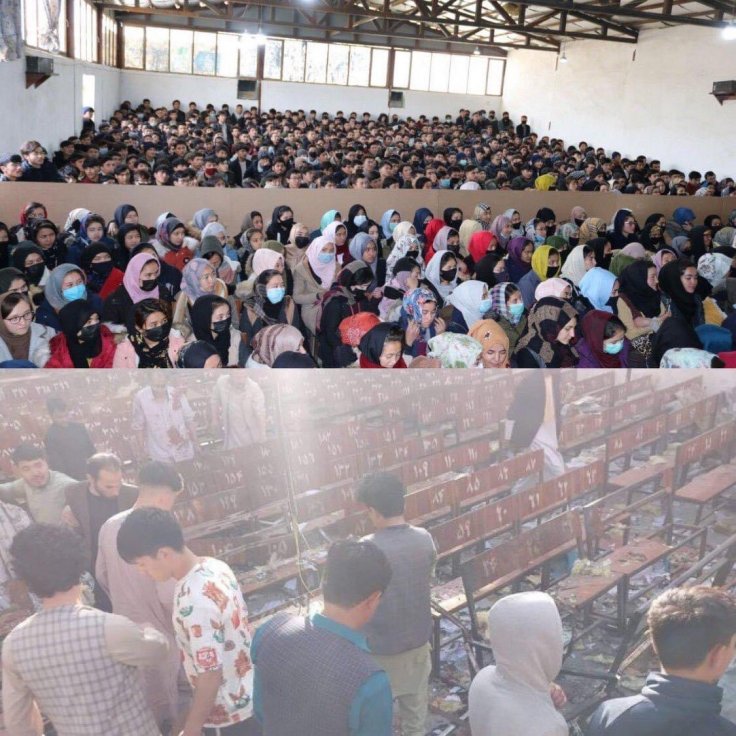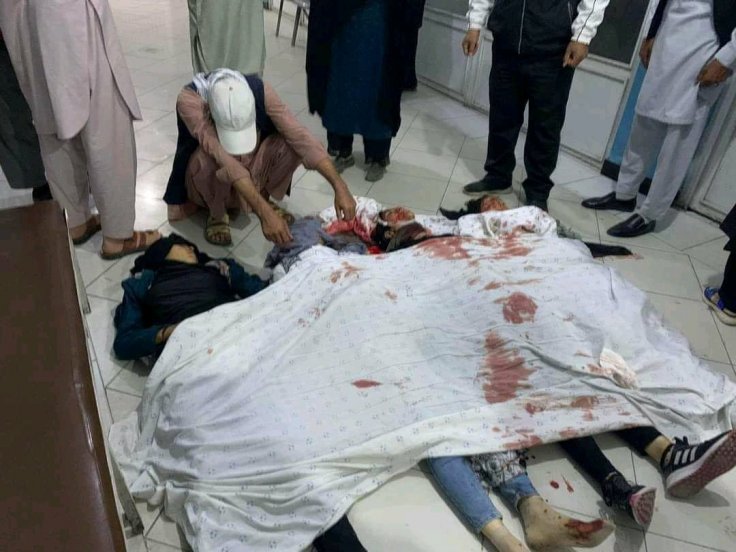A blast in Afghanistan capital Kabul last week killed scores of children and young women. Initial reports said at least 23 people were killed and more than 80 were wounded. The latest reports say the death toll has substantially gone up.
The blast happened at the Kaaj educational centre in the Dasht-e-Barchi neighbourhood, a predominantly Shia Muslim area which is home to the minority Hazara community.
Police spokesman Khalid Zadran said students were preparing for an exam when a suicide bomber struck at the Kaaj educational centre. The victims included high school graduates, both girls and boys, who were doing a practice university entrance exam when the bomb went off. The police said Kaaj Higher Educational Centre coaches students, mainly adult men and women, to prepare for university entrance exams.

Zadran said attacking civilian targets proves the enemy's inhuman cruelty and lack of moral standards.
Majority of the Victims Were Girls
But a wounded male student revealed that the victims were mainly girls. He said they were around 600 students in the classroom. Taiba Mehtarkhil, an eyewitness, told the local news media that many casualties were young women. She said she had gone to the centre to look for a friend after she heard news of the attack and was confronted with scenes of chaos and despair. "I saw parents, members of families of the students, screaming and running up and down. Some were trying to get emergency medical attention for their loved ones and some were looking for their sons and draughts." Taiba revealed that she saw around 20 killed and many more wounded.

Who are Afghanistan's Hazaras?
The Hazaras are one of the main ethnic and religious minority groups in Afghanistan. It has been for long subjugated and subjected to discrimination and persecution because of their ethnic and religious identity.
The origins of the Hazara community are much debated but common myth suggests that Hazaras originated from a contingent of the army of Genghis Khan in the 13th century; there is no historical evidence to support these claims. Other more plausible theories suggest that Hazaras are more likely to have descended from communities that inhabited the region well before the advent of Genghis Khan.
In Afghanistan, the Hazaras are known for their distinctive music and literary traditions with a rich oral history, poetry and music. Hazaragi poetry and music are mainly folkloric, having been passed down orally through the generations.
Why are Hazaras Targeted?
Hazaras are regularly targeted by the Taliban insurgency because of their support for democracy in Afghanistan. The terror group's perceptions that Hazaras had stepped out of their historical role as a subordinate and inferior group led the extremists to push back in an increasingly targeted and violent manner.
The Hazara's now face direct threats and systematic discrimination. There is no meaningful political inclusivity or representation for Hazaras at any level in the Taliban's totalitarian Islamic Emirate of Afghanistan. The Taliban has limited inclusivity only to Sunni religious groups.
Ethnic Hazaras are also being dismissed from the government's bureaucracy under the pretext of reform to make an "Islamic" system designed by and for the Taliban. Hazaras are neither represented in the Taliban interim cabinet (33 members), nor as provincial and district governors (34 provinces, 387 districts), mayors, or police chiefs.
In the three largely Hazara-populated provinces of Bamiyan, Daikundi, and Ghazni, Hazaras do not occupy any senior government position. The exclusion of Hazaras at all levels is largely due to their history of opposition to the Taliban.
What is Afghanistan's Hazara Population?
The Hazaras make up around 20 percent of Afghanistan's population. However, the actual population figure is highly uncertain as the country's authorities have never conducted a national census of the population. It is broadly recognized that none of the country's ethnic groups form a majority and the exact percentages of each group as part of the national population are estimates and often highly politicized.
The size of the Hazara community has also declined because of forced migration, land grabbing and persecution. They were once the largest Afghan ethnic group, constituting nearly two-thirds of the total population of the country before the 19th century.
Isis Affiliates Behind Hazara Attacks
The Human Rights Watch in its September report outlined that the Islamic State of Khorasan Province (ISKP), an affiliate of the ISIS armed group in Afghanistan, targeted Hazaras and other minorities in a wave of attacks at mosques, schools and workplaces.
The ISKP claimed responsibility for 13 attacks against the Hazaras. It also carried out other mass casualty attacks, including the August 2021 suicide bombing at Kabul airport that killed 170 Afghans, mainly civilians. ISKP attacks have taken place in Kabul, Jalalabad, Herat, and other cities. Some have targeted Hindu and Sikh religious minorities, as well as Hazara. Their attacks first surged in 2016-2018 and then ebbed after the group suffered military setbacks in 2019. Since 2020, attacks have again increased. The HRW said ISKP's public statements make clear that the murderous attacks reflect a deliberate policy.
Hazara's Fate Under Taliban
The Taliban's rule since the 1990s has proved to be devastating for Hazaras. Thousands have been persecuted and massacred over the years. In August 1998 alone, over 2000 Hazaras was killed by the Taliban. This was described as "genocidal in its ferocity" by journalist Ahmad Rashid. Mass graves of this minority community were also been discovered in Bamiyan before the fall of the Taliban regime in 2001.
The Hazara have been increasingly concerned for their safety and whether the new authorities will protect them. "The Taliban never liked Hazaras," said one Hazara community member in Bamyan province. "Last time they were in power, they killed many of us."
Another Hazara resident who witnessed many previous attacks said the children need to go to school. "Our women need to visit hospitals, we want to go to mosques. For all these we need to feel safe. For God's sake, these places cannot be targets – stop killing us everywhere."
More Attacks After Taliban Take Control of Afghanistan
Now it's happening all over again after the Taliban returned to power in 2021. The minority community has been the victims of several attacks claimed by the rival ISIL (ISIS) group. Samira Hamidi, Amnesty International's South Asia campaigner, said the killings are a shamefaced reminder of the inaptitude and utter failure of the Taliban, as de-facto authorities, to protect the people of Afghanistan.
Taliban Condemns the Latest Attack
Taliban spokesman Zabiullah Mujahid, condemned the attack. The Taliban said serious measures would be taken to find and punish the perpetrators. Though the terror group that took control of Afghanistan last year said it is securing Afghanistan following decades of war, a series of attacks on mosques and civilian areas in recent months has flipped that narration.
At least 85 people, mainly girl students, were killed and around 300 injured in 2021 when three bombs went off near a school. In April this year, two deadly bomb blasts rattled separate education centres killing six and injuring scores.








